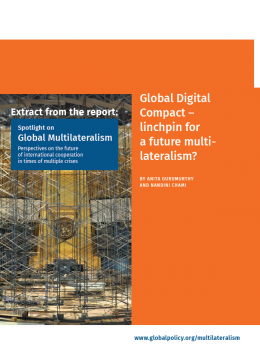
Global Digital Compact – linchpin for a future multilateralism?
By Anita Gurumurthy and Nandini Chami
The Global Digital Compact (GDC) is a proposed agreement to be forged at the Summit of the Future (2023) to lay down shared principles for an “open, free and secure digital future for all”, building on a multistakeholder technology track of consultations with governments, UN bodies, private sector entities and civil society organizations.
At the moment, it is unclear whether the GDC will be able to fulfil the governance deficit stemming from the lack of a global home for digital public policy issues. Internet Governance Forum (IGF)-style ‘multistakeholderism’ has produced a legitimacy crisis, with values of ‘inclusion’, ‘equity’, ‘participation’ and ‘fairness’ coopted into win-win governance imaginaries that circumvent democratic accountability. It is clear that our datafied futures can least afford this normative vacuum.
The hope, therefore, is that the technology track consultations dovetailing into the intergovernmental Summit process can produce a new institutional roadmap for a socially just digital transition. Yet, without taking current failures on board, there is a real risk that the consultations may do little to challenge the considerable agenda-setting power that transnational digital corporations wield in multiple areas of global governance.
Getting the GDC right is not just a technical governance issue. It is about envisioning the human condition as digitality shapes the anthropocene. This brief identifies concrete asks from the GDC for a just, equitable and sustainable future for people and the planet. Rejecting outright a compromised multistakeholderism that puts corporations in the driving seat, it advocates for a multilateral decision-making process by UN Member States grounded in transparency and deliberation, and aided by a structure for people’s constituencies to engage in agenda-setting.
